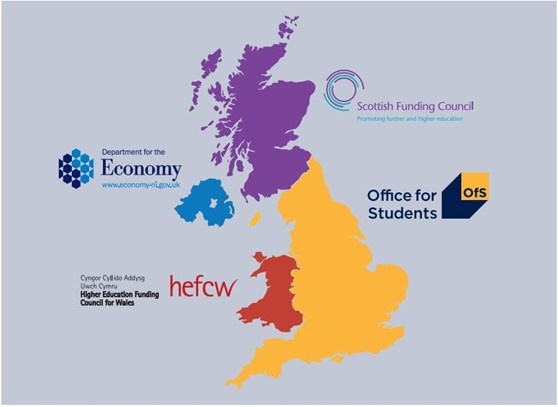Stay up to date with our work
Our monthly updates are a great way for you to stay up to date with our work, events, and higher education news.
Last updated on Wednesday 5 Apr 2023 at 3:18pm

From 1 April 2023, the Quality Assurance Agency for Higher Education (QAA) will no longer perform the role as designated quality body (DQB) in England. Since the announcement last summer, debates over quality assurance have caused questions outside of the UK about the meaning of these changes.
To be clear, the quality of our universities is not in doubt. UK higher education is world leading, with excellence and expertise across all types of institutions and subjects: the UK’s national audit of research, the Research Excellence Framework (REF) 2021, rated four in five outputs as either “world-leading” or “internationally excellent”. The Graduate Outcomes survey results 2019/20 showed that 89% of graduate were in some form of work or further study.
UK higher education is underpinned by rigorous internal and external quality assessment and quality assurance mechanisms. All universities across the UK operate under a national funding or regulatory body – whether that is in England, Northern Ireland, Scotland or Wales – and within a framework of shared principles. Just how these are implemented differs, and it is incumbent on us, as a sector, to explain both the underlying principles and the distinct characteristics that uphold the high quality and standards students can continue to expect from our universities across the nations of the UK.
How is higher education – including transnational education – regulated?

Source: Office for Students
Higher education is a devolved matter with oversight by the respective government and parliament. Each of the four UK nations controls its own policies and systems for regulating the quality of higher education, including degrees delivered via transnational education (TNE), and has its own funding/regulatory oversight body:
While each body has a distinct approach to quality, they are underpinned by common principles which ensure that the standards of qualifications are secure, and that students receive a high-quality academic experience – wherever the degree is delivered in the UK or via TNE outside of the UK.
All approaches across the four nations focus on:
The UK Standing Committee for Quality Assessment (UKSCQA) provides additional sector-led oversight of quality assessment arrangements that are shared across the UK. By bringing together the four UK funding/regulatory bodies and by drawing on academic, student and regulatory experience from across the sector, the Committee supports a collaborative approach to quality and standards to promote the student interest and the international reputation of UK higher education.
So, what does the change in DQB status in England mean?
The QAA is a membership organisation for universities in all four UK nations and an independent quality body that delivers reviews and/or enhancement work for the funding and regulatory oversight bodies in Northern Ireland, Scotland and Wales. This is not changing. In England, the QAA also undertook reviews and assessments as the DQB on behalf of the OfS. However, from April, the OfS will be taking on the assessment functions previously delivered by the DQB on an interim basis.
This has, understandably, caused some confusion. The QAA is, after all, a well-known and respected agency that has supported many other systems to develop their own quality regimes. Indeed, some international partners have asked whether, with this change, universities in England will no longer be regulated. This is not the case. Overseas partners can be assured that any institution that is on the OfS Register, has met and is continuing to meet the high quality and regulatory standards required by the government and the regulator.
Being recognised on this English register gives institutions access to public funds for student support and funding to support teaching, just as the separate regulatory arrangements do in Northern Ireland, Scotland, and Wales. It is also a precondition for the ability to recruit international students. Any university in England that fails to uphold the standards set by the regulator can be removed from the register and lose access to public funding and the ability to award degrees. These are robust powers. As part of its regulatory duties in England, the OfS takes a risk-based, principles-based and student outcomes-focused approach to its ongoing monitoring of quality, drawing on a range of data and intelligence. The OfS regulations cover all higher education courses in England, including those delivered via transnational education. Where it has concerns about provision by institutions in England, the OfS will not shy away from investigating any perceived issues. International partners should therefore be confident that universities, the regulator, and the government in England – as in all nations of the UK – take their individual and shared responsibilities extremely seriously.
Where do we go from here?
Universities in all four UK nations are robustly regulated to ensure a high-quality student experience. Universities themselves also undergo rigorous internal quality assurance processes to ensure they meet expectations of the national regulatory/funding body. On top of this, the UK higher education sector is strongly committed to enhancing quality and institutions themselves often go beyond the regulatory requirements, leading the way in bringing the sector together to self-regulate and uphold academic standards. In 2022, Universities UK and GuildHE worked with the QAA to develop new principles to guide effective practice in external examining.
Universities UK and GuildHE also commissioned the QAA as a membership organisation to develop a voluntary quality evaluation and enhancement (QE-TNE) scheme for 2021-22 to 2025-26 which demonstrates the commitment of UK higher education to deliver high-quality TNE experiences for students and over 75 universities participate in this.
At UUKi, we have been and will continue to engage with overseas regulators and governments to provide clarity on how regulation and quality are approached across the UK nations. UK universities are open and ready to develop TNE partnerships across the world and overseas governments, regulators and partners can rest assured that they deliver a high-quality and world-leading student experience.
Our monthly updates are a great way for you to stay up to date with our work, events, and higher education news.